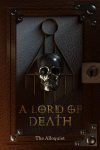
“Approximately six months and one hundred and ten thousand words later, A Lord of Death is finished! What started with a fairly innocuous writing prompt (thanks u/GopnikBalls), turned into a longer than average novel in what might very well be a pentology. So congratulations, you managed to get to the end! Or at least, the end of the first draft.”
I wrote that almost three years ago. Oh how innocent I was. I used to make memes about other author’s word counts, and thus the sting of hubris comes around to bite my ass.
The perennial question still remains:
What happens now?
Problem? #1: The Metaquestions
There’s obvious micro-issues, grammar/spelling/formatting etc., which can be solved with a dictionary, the Chicago Manual of Style, and regular applications of caffeine. Hence, they are not interesting.
Why did I write this?
I ask myself that with both genuine curiosity and increasing sardonic dread.
I have been reading quite a lot of craft books recently: Writing Fiction by Janet Burroway & Elizabeth Stuckey-French, The Art of Fiction by John Gardener, and so on. The reasons for this are manifold, but among them is earnest desire for an evaluative framework for my own creativity. Almost all of them begin with the why of writing. Many note that a lot of writers begin with a burning desire to externalize their writing: to comment, to critique, to observe, and so on.
Anyone who has sat through a movie, or god-forbid, a TV show with me, knows my nearly hard-wired penchant for critique. A month or two ago I walked out of Across The Spiderverse, an excellent movie by practically every standard (including my own), and among my first thoughts were ‘hmm. That didn’t feel as tightly written as the first one’.
It might surprise you then to learn that I barely think about deeper analysis when I write. Certainly there’s worldbuilding, characters, plot etc. but I skim over theme, symbolism, and so on. If I write to comment, I write critiques, not novels; in other words, my creative work is divorced from my critical.
John Garderner, a preeminent professor of creative fiction, split creative works into three rough categories: the conventional, the metafictional/deconstruction of the conventional, and “jazzing around.” ALOD occupies a very strange space in that regard.
“[WP] For centuries you've been a target for all adventurers as you are the ruler of the undead. You are tired of being harassed by these wanna be heros and being labeled as a monster. So you devise a plan to make everyone see you as a 'hero'.”
That’s how this bastard of a project started on Feb 12th, 2020.
It was meant to just be ‘jazzing around’; just a fun little story in response to a comedic prompt. But to write part two, I had to construct an inciting incident: A paladin messing up the castle. Where did that paladin come from, what was their religion? And the whole thing spiraled up and out until I had a whole world on my hands (in colloquium ‘pulling a Tolkein’).
Certainly at this point my deconstructive tendencies came out to play, albeit mostly subconsciously. The paladin and the religion they represented was questionable, the lich was not a dark lord merely a surly academic, and so on. Altering the question slightly to fit the point:
What exactly is the point of ALOD?
Well, it’s certainly not to elucidate complex didactic or moral positions. But at the same time, it’s caught in uncomfortable tension: On one hand, low-stakes comedic roots are designed to make people laugh, on the other, the genre runs dark fantasy, with all its ‘realistic’ dynamics. I’m still thinking on how I reconcile that, but the answer is probably going to lean more towards the latter than the former.
As for why I write?
¯\_(ツ)_/¯
Problem? 2: The Less Meta Questions:
It probably would be easier to list the non-problems of the narrative; which can be broadly summed up as ‘it has good ideas and some good moments’.
I could go into detail about ideas I have which range from definite (‘The first quarter needs to be severely edited to get rid of all the plot threads that never went anywhere’), to the speculative (‘maybe I should cut Sorore’s POV entirely - I’m unsure of how much it adds), but that wouldn’t necessarily be productive.
Instead I’ll briefly talk about what isn’t going to happen.
I will not be doing another publishing run of ALoD book #1 on RR/SH/RS, etc. The next time I publish this it will be complete, having all editing done. Now that opens up questions of where and when, and the answer to both is a shrug. Some I’ve spoken with have suggested I try traditional publishing, a deep can of worms to open. Many have suggested Amazon instead, which is probably more likely.
Either way, the next time you read the prologue, it should be part of a ‘proper’ book.
With that, I’ll open the floor to you and your concerns. Having read all the way through, what changes would you make, and what flaws do you see? It’s useful to have other eyes on the work (even if I don’t ultimately agree).
Thank you for reading and see you (hopefully) soon,
The Alloquist


